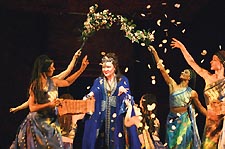Lost in the Crowd
'Samson et Dalila' flies high on the efforts of its stars, but stumbles in comparison to more recent offerings
There are times, unfortunately, when an exceptional and beauteous piece of art nonetheless finds itself dismissed as not quite good enough, simply because it finds itself surrounded by works even more exceptional.
That is the fate of Camille Saint-Saens’s Samson et Dalila, a fine and sometimes quite engaging production that unfortunately suffers greatly coming on the heels of the brilliantly presented Tosca. Director Peter McClintock brings a consciously unhurried, thoughtful mood to this legend of love betrayed, but as a whole it falls just shy of the kind of magical cohesiveness and energy that turns good into great.
 Flower power: Boradina with handmaidens (Photo by Karin Cooper) |
Hometown tenor Carl Tanner, who hails from Arlington, has a nicely-toned, strong — even noble — voice, but his middle range on opening night had a hint of raspiness to it that distracted the ear. He is an accomplished actor who, given a chance, takes control of the stage to meaningful effect. Unfortunately, the choreography and the direction, particularly in the first act, sometimes left him loitering on the periphery. His love scene with Dalila when she first betrays him is unfocused, leaving him dashing about the stage with little emotional impact. Luckily, the final scenes of the opera focus firmly on his journey to and from despair, and we see Tanner take hold of the stage. Given the room to work and sing, he is impressive.
Mezzo-soprano Olga Borodina as Dalila is a beautiful and exotic performer. Her extraordinary voice suits perfectly her mysterious, uncompromising Dalila. Borodina shows us that acting can be writ small and yet still be highly effective. She moves with a slow, encompassing grace, but her face, with the smallest of smirks or the quickest furrow of the brow, shows us that there is a dangerous inner life to Dalila. She is exciting to watch.
Thus there are two very strong performers at the helm of this production. Yet their brilliance can’t quite overcome the larger failings in McClintock’s directorial choices. For example, although we are carefully and methodically enveloped by the brooding melancholy of the music thanks to Placido Domingo’s fine opening night conducting, that spell is broken during the main dance sequence right in the middle of the opera. There is no doubt that the dancing is intrinsically good in many respects and Cuban soloist Fidel Garcia is very compelling, but the choreography thrusts (sometimes literally) a modern raunch sensibility into a production whose mood is otherwise all about subtle suggestion and the life of the heart. As thrilling as it may be for the octogenarians in the front rows, the truth is this kind of gluteal jiggling utterly breaks the fiction. It was an MTV idea of a fertility/sacrificial ritual dance and completely out of step with the rest of the concept. McClintock should have toned it down and let the opera keep to its low-key themes.
|
The other mood-breaker unfortunately comes in the finale with the much-touted actual collapse of the Philistine temple. Though many of the thoughtful set ideas such as the low ceilings and confined spaces worked well earlier in the opera, this last stunt comes across as cumbersome enough to spoil Samson’s moment of victory. It must have been a prodigious bit of design and engineering to get this all to work, but is realism really the goal? Perhaps the tumbling pillars might be given a pass in the name of good intentions, but when several pieces of ceiling fall into the fore-ground with the obvious precision of self-conscious staging, a lot of goodwill is lost. What have we gained here dramatically?
Finally, it is also impossible to watch this version without recalling the production staged by the Washington National Opera a few seasons ago, which was significantly superior in choreography, staging and pacing. The opening scene in which the chorus called to God while lying face down on a stage lifted at a dizzying angle was one of the most memorable in recent years. This time around, the voices are good, the music is good, but expect no such heart-stopping moments.
Support Metro Weekly’s Journalism
These are challenging times for news organizations. And yet it’s crucial we stay active and provide vital resources and information to both our local readers and the world. So won’t you please take a moment and consider supporting Metro Weekly with a membership? For as little as $5 a month, you can help ensure Metro Weekly magazine and MetroWeekly.com remain free, viable resources as we provide the best, most diverse, culturally-resonant LGBTQ coverage in both the D.C. region and around the world. Memberships come with exclusive perks and discounts, your own personal digital delivery of each week’s magazine (and an archive), access to our Member's Lounge when it launches this fall, and exclusive members-only items like Metro Weekly Membership Mugs and Tote Bags! Check out all our membership levels here and please join us today!
























